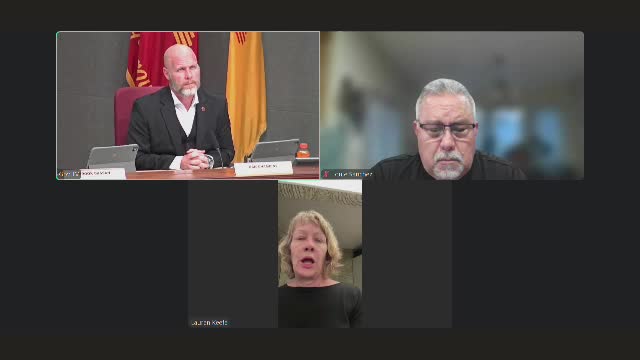Council's administration Q&A covers APD academy trial, rail-trail costs, small-business window grants and AEDs
Get AI-powered insights, summaries, and transcripts
Subscribe
Summary
At the Nov. 5 administration question-and-answer period, the city attorney said the APD academy case went to trial and the city lost but will appeal; councilors also pressed for clarity on rail-trail costs, received a status update on a small-business window-reimbursement program and pushed administration to provide AEDs and training for council offices.
The Albuquerque City Council used the Nov. 5 administration question-and-answer period to press the mayor's executive team on multiple operational matters including an APD academy trial verdict, rail-trail funding figures, the small-business "broken windows" reimbursement program, AED placement and training for Council offices, and public-reporting timelines.
APD academy case and funding: City Attorney Lauren Keefe told the council the case went to trial; the city did not prevail and intends to appeal the verdict. Keefe said certain legal rulings at trial provide grounds for appeal. If the verdict stands, any payments would be drawn from the city's risk fund rather than a new appropriation. "The funding comes from the risk fund," Keefe said when asked where settlement costs would be paid from.
Rail-trail funding and public confusion: Councilors asked for clarification about a public statement referencing $11.5 million being removed from rail-trail funding and whether that represented one-third of a specific segment or of the entire project. The CAO and staff said the rail-trail is planned in segments, costs differ by segment and staff will provide a segment-by-segment estimate and documentation of what the $11.5 million covered.
Broken windows small-business program: The Economic Development director reported results from the initial round: 93 applicants, 87 eligible, about 210 windows replaced and an average reimbursement just under $2,300 per eligible business. A second round opened Oct. 23; as of the morning of the meeting eight applicants had applied, two were ready for payment and the total allocation for the second round is $201,500. The program requires participants to complete an APD security-site-hardening survey as a condition of reimbursement.
AEDs and training for Council offices: Councilor Rogers pressed for a working automated external defibrillator (AED) for Council Services after a months-long delay. Administration representatives said new public-access AEDs are being ordered and that Metro Security will oversee installation, remote monitoring and maintenance; the plan calls for two publicly accessible AEDs per floor in City Hall, installation signage and training for staff and the public. The administration said equipment has been ordered and installation dates would be provided; Councilor Rogers said she would purchase an AED if the vendor date was not provided promptly.
Other administrative reports: The CAO said the Albuquerque Progress Report (Indicators) has been delayed because the advisory commission struggled to make quorum and that staff continue to work with the commission to finalize the 2024 report. Albuquerque Fire Rescue monthly call reports paused while a PIO/backfill process is completed; AFR said the monthly reports will resume in January 2026 and data remains available on request. City Clerk Watson described a process error that led to a measure (P2057) not being sent to the county for the ballot; the clerk's office will change its post-enactment memorandum to document follow-up steps and pursue a Legistar field to track final steps.
What happens next: the city attorney will proceed with appeal of the APD academy case; the CAO's office will provide segmented rail-trail cost estimates; Economic Development will continue and pay the second-round broken-windows recipients; Metro Security and vendors will provide an AED installation schedule and training plan; the city clerk will modify internal documentation to prevent future ballot omissions.
